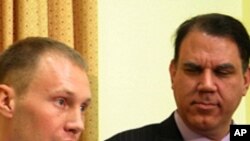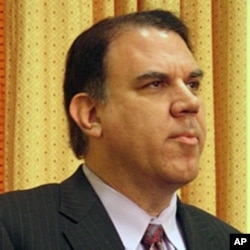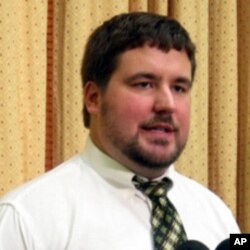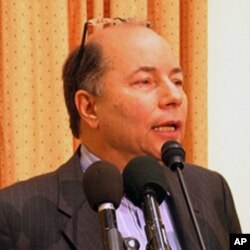Members of the U.S. Congress received a classified briefing on Tuesday on the war in Afghanistan from two Obama administration officials - Secretary of Defense Robert Gates and Secretary of State Hillary Clinton. At the same time on Capitol Hill, a Democratic lawmaker and anti-war activists spoke out against President Barack Obama's U.S. troop surge in Afghanistan.
Secretaries Gates and Clinton briefed lawmakers behind closed doors in the House of Representatives on President Obama's Afghanistan strategy and the expected costs of adding 30,000 U.S. troops to the international force already there.
As the troop surge picks up momentum, members of Congress are concerned about how expensive the buildup will be between now and July 2011 - the date the president set to begin a drawdown of U.S. forces, the speed of which will depend on conditions in Afghanistan.
Gates and Clinton were to have briefed a joint hearing of the House Committee on Appropriations, but that event was postponed.
In brief remarks to reporters, Secretary Clinton said President Obama is committed to ensuring that additional funds for the troop buildup - which the Pentagon estimates will cost between $30 and $35 billion - will be reflected in the 2011 fiscal year budget, which is request expected on Capitol Hill in February.
At the same time, one Democrat who has emerged in recent months as one of the most outspoken war critics in Congress used a news conference to argue that the troop buildup is a costly mistake.
Calling the president's Afghanistan effort "an 18th century strategy being employed against a 14th century enemy," Florida Representative Alan Grayson said the ability of the United States to bring peace to Afghanistan is limited.
"Afghanistan is never going to look like Minnesota, nor should it. It is on its own path and we need to let it go on its own path as long as it doesn't affect our security," he said. "It did affect our security in 2001; we took care of that problem."
"We eliminated the Taliban government. We expelled al-Qaida. The fundamental problem that we are facing right now is that we are trying to win the same war twice," he continued.
Appearing with Grayson were two U.S. military veterans turned anti-war activists.
U.S. Army Specialist Mathew Justice spent nine months in Afghanistan as part of a team that disarmed improvised explosive devices.
Even if it were possible to train additional Afghan troops, he said, Afghanistan's economy still would be unable to sustain a larger force. Justice added that deepening the U.S. commitment in Afghanistan will not bring more security.
"Never while my life was in danger, did I feel as if I were avenging those lost in the attacks on September 11, 2001, nor did I feel my efforts were contributing to my nation's safety," he said. "I find it absurd that we should deepen our commitment to this war of choice."
Former U.S. Navy Petty Officer 2nd Class Nathan Toth, who served from 1999 to 2003 on the USS Theodore Roosevelt, said he believes that Afghanistan became a "war of choice" for the United States, rather than one of necessity, after the ouster of the Taliban government.
Toth said the true costs of the war for U.S. troops and their families have not been given enough attention.
"I had two friends who served in Afghanistan that after they came home, they took their own lives due to untreated and undiagnosed PTSD [Post-Traumatic Stress Disorder]," he said. "I have friends who have become drug addicts and alcoholics because they couldn't cope with some of the things that they went through."
Toth and Justice are members of Veterans for Rethinking Afghanistan, a group advocating more focus on non-military solutions for the problems in Afghanistan and Pakistan.
Also appearing at the news conference was Robert Greenwald, a film producer and political activist who has released a documentary on the Internet called Rethink Afghanistan.
"The more people learn about it [Afghanistan], the more they don't like it," he said. "The more fundamental questions that are asked, the more people are distraught [and ask] what is the mission, why are we there, how many troops, what does it cost, what is the exit strategy?"
But anti-war lobbying on Capitol Hill is unlikely to block approval of funds, although individual lawmakers might try to attach conditions to any legislation.
Although Secretary Clinton said funding for the U.S. troop surge would be "fully accounted for" as part of the regular government budget, House and Senate Democrats say they expect the White House to ask for the money in a separate supplemental request.
A stand-alone Afghanistan funding bill would place lawmakers from both major parties in the position of having to make a highly-visible vote specifically on whether to fund the controversial war effort.











